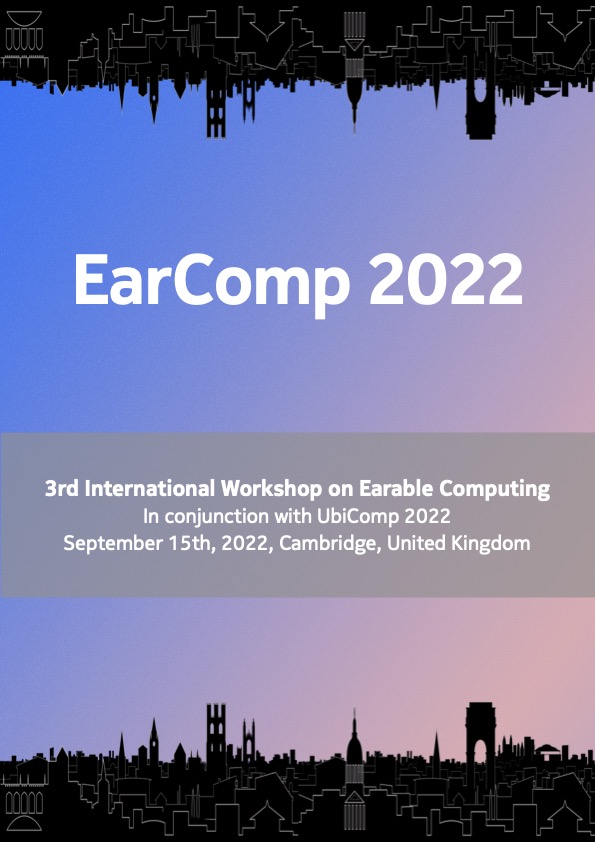
EarComp 2022
3rd International Workshop on Earable Computing
In conjunction with UbiComp 2022, September 15th, 2022
(EarComp 2019)

Overview
However, as of today, earable computing lacks an academic forum to bring together researchers, practitioners, and design experts from academia and industry to discuss, share, and shape this exciting new area of research. To this end, we are organising the third workshop on Earable Computing with a hope that this workshop will serve as a catalyst for advancements in sensory earable technology as well as present a clear sense of direction for the research community to proceed in this space.
Keynote
Using wearables and theatre to study the social brain.
 Dr Jamie A Ward
Dr Jamie A Ward
Jamie is a lecturer at the Department of Computing, Goldsmiths, University of London. He received his Ph.D. in electronics from ETH Zurich, where he developed some of the first uses of multi-modal, wearable sensing for human activity recognition. He continued this work as a Marie Curie Research Fellow in Computing at Lancaster University, and later as a postdoc at DFKI Germany, and the UCL Institute for Cognitive Neuroscience. In between these posts he retrained and worked as an actor. His work centres around the convergence of technology, neuroscience, theatre, and autism. For more details, see www.jamieward.net.
Hearing and Well-Being: Hearables as Game-Changer
 Andrew Bellavia
Andrew Bellavia
Andrew has been deeply engaged with the latest in hearing health and the intersection of hearing and well-being. He recently founded a new company, AuraFuturity, to provide go-to-market, branding, and content services to companies in the hearing health and hearable markets. Previously Andrew was the Director of Market Development for Knowles Corp, a leading acoustic solutions provider to the hearing health, hearable, mobile and IoT industries. His experience goes back to the beginnings of hearable development with companies such as Bragi, Doppler labs, Amazon, and many more since. Connect and learn more on LinkedIn and Twitter. Learn more at aurafuturity.com.
Program

-
enVolve: Are You Listening? Inertial Sensing to Monitor the Involvement of Silent Listeners during an Online Interaction.
Mr. Garvit Chugh, Suchetana Chakraborty, Ravi Bhandari, Dr Sandip Chakraborty
-
Excerpt of ToothSonic: Earable Authentication via Acoustic Toothprint.
Zi Wang, Yili Ren, Professor Yingying Chen, Professor Jie Yang
-
A Taxonomy of Noise in Voice Self-reports while Running.
Tao Bi, Dr Temitayo Olugbade, Akhil Mathur, Catherine Hollowa, Dr Aneesha Singh, Enrico Costanza, Professor Nadia Berthouze
-
Multimodal Attention Networks for Human Activity Recognition From Earable Devices.
Jake Stuchbury-Wass, Andrea Ferlini, Cecilia Mascolo
-
Excerpt of Auritus: An Open-Source Optimization Toolkit for Training and Development of Human Movement Models and Filters Using Earables.
Swapnil Sayan Saha, Sandeep Singh Sandha, Siyou Pei, Vivek Jain, Ziqi Wang, Yuchen Li, Ankur Sarker, Mani Srivastava
-
Excerpt of PPGface: Like What You Are Watching? Earphones Can “Feel” Your Facial Expressions.
Seokmin Choi, Yang Gao, Yincheng Jin, Se Jun Kim, Jiyang Li, Wenyao Xu, Zhanpeng Jin
-
Excerpt from "Sensing with Earables: A Systematic Literature Review and Taxonomy of Phenomena".
Tobias Röddiger, Christopher Clarke, Paula Breitling, Tim Schneegans, Haibin Zhao, Hans Gellersen, Michael Beigl
-
Using Earables Platforms to Study Verbal Communication.
Alejandro Perez, Matthew H. Davis
-
OpenEarable: Open Hardware Earable Sensing Platform.
Tobias Röddiger, Tobias King, Dylan Ray Roodt, Christopher Clarke, Michael Beigl
-
A Preliminary Study for Detecting Visual Search Behaviors During Street Walking Using Earable Device.
Mr. Kazuki Shimojo, Zengyi Han, Yuuki Nishiyama, Kaoru Sezaki
-
Designing and evaluating a system for studying EarEEG signals.
A Adarsh, Meghana S, Dr Kartik Muralidharan, Jayavardhana Gubbi, Mr. Ramesh Kumar Ramakrishnan, Dr. Arpan Pal
Call For Papers
All papers will be in ACM sigconf template with 2 columns and all of the accepted papers (regardless of category) will be included in the ACM Digital Library. All papers will be digitally available through the workshop website, and the UbiComp adjunct proceedings. For each category of papers, we will offer a "Best Paper" and "Best Dataset" awards sponsored by Nokia Bell Labs.
Topics of interest (NOT an exhaustive list):
The presentations will be in person, but we will accomodate both live remote presentations and pre-recorded remote presentations.
Submission & Timeline
Alternatively, the Overleaf version can be found here.
Latex documents should use the “sigconf” template style. Word users should use the interim template downloadable from the ACM site.
Submission Site: https://new.precisionconference.com/submissions
Submission Instructions: to select the appropriate track choose "SIGCHI" in the field Society, "Ubicomp/ISWC 2022" as Conference, and, finally, pick "Ubicomp/ISWC 2022 Workshop: EarComp" as Track.
- Submission Deadline: August 31, 2022 (11:59 PM PDT)
- Acceptance Notification: September 7, 2022
- Camera Ready Deadline: September 11, 2022
- Workshop: September 15, 2022
Organisers
Alessandro Montanari, Nokia Bell Labs Cambridge
Dong Ma, Singapore Management University (SMU)
Fahim Kawsar, Nokia Bell Labs Cambridge
Program Chairs
Andrea Ferlini, Nokia Bell Labs Cambridge
Xiaoran "Van" Fan, Google, Technology Directions Office (TDO)
Web, Publicity and Publication
Kayla-Jade Butkow, University of Cambridge
Program Committee
Cecilia Mascolo, University of Cambridge
Marios Costantinides, Nokia Bell Labs Cambridge
Michael Beigl, Karlsruhe Institute of Technology
Ting Dang, University of Cambridge
Longfei Shangguan, Microsoft Research
Yang Liu, University of Cambridge
Shubham Jain, Stony Brook University
Anran Wang, University of Washington
Octavio Ponce, Google
Przemysław Pawełczak, TU Delf